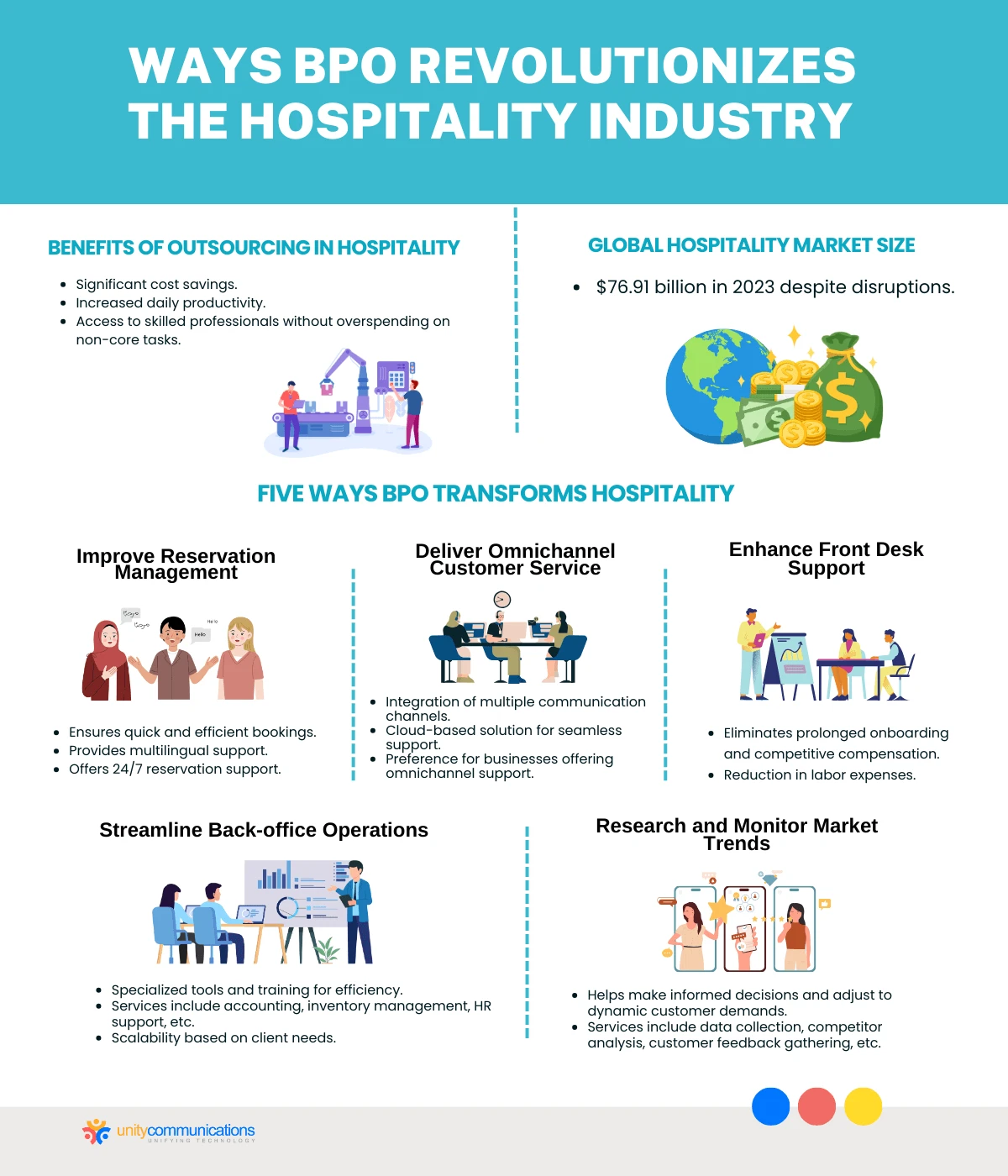Table of Contents
Whether going to a spa, traveling the world, or sleeping, people always find ways to unwind. Hospitality businesses thus play a crucial role in helping them cool off. But what if non-core tasks stress these organizations out? How can they ensure an unrivaled customer experience?
Business process outsourcing (BPO) is the key. Providers optimize cost-effective resources to assist in delivering high-quality hospitality services. They also execute robust strategies to achieve operational efficiencies.
Explore how outsourcing positively impacts guest services below.
Five Ways BPO Revolutionizes the Hospitality Industry

Many individuals seek affordable ways to de-stress after a long week at work. They turn to various travel and hospitality businesses for any recreational activity that fits their budget. The global hospitality market thus reached nearly $76.91 billion in 2023, despite the global health crisis and other disruptions in the prior years.
Companies adopt outsourcing to ensure high-quality guest services. Partnering with a BPO service vendor gives them significant cost savings and increases their daily productivity. This approach allows them to access skilled professionals without overspending on non-core tasks.
Apart from these BPO advantages, providers help transform the hospitality sector in five ways. Let us detail each of them here.
1. Improve Reservation Management
Enhancing the booking process is among the important benefits of outsourcing. Although reservation management does not directly generate revenue, this function is critical to maintaining good customer relationships. It ensures customers can check into a hotel, eat at a restaurant, or visit a tourist spot without worrying about vacancies.
BPO companies employ well-trained staff and automated systems to ensure quick and efficient bookings. They also provide multilingual support to cater to international guests. Moreover, automation enables vendors to deliver 24/7 reservation support, regardless of time zones or peak hours.
2. Deliver Omnichannel Customer Service
What started as call centers are now contact centers delivering comprehensive customer service by integrating multiple communication channels. Since the popularity of online transactions, consumers have begun to demand quick and effective support. But they want it through their preferred medium; 93% of Zendesk’s polled users state they would spend more on businesses that offer the option.
As such, service vendors provide omnichannel support to help hospitality clients boost customer satisfaction. This cloud-based solution lets agents respond to multiple inquiries from the following channels without losing data or causing inconsistencies:
- Voice call
- Live chat
- Social media
- Text messaging
- Video chat
For instance, if customers reach out first through a social media platform to book a flight, they can clarify additional details by interacting with an agent over the phone. In a similar study by Zendesk, 92% of customers favor this seamless channel switching because they do not need to repeat information. This flexibility encourages them to stay loyal to the brand.
3. Enhance Front Desk Support
BPO organizations assist in improving hospitality businesses’ front desk support, especially during hectic periods. Third-party front desk workers undergo regular training that prepares them for immediate field deployment.
Hence, hotels and restaurants can instantly hire them when they need extra hands during the holidays. Outsourcing eliminates the need for prolonged onboarding and the competitive compensation usually provided to new hires. Providers also cover employee benefit packages, while client companies only pay for hourly rates, significantly reducing labor expenses.
4. Streamline Back-office Operations
Working with a service provider makes back-office processes more efficient. BPO companies use specialized tools and frequently train employees to accomplish the listed tasks seamlessly.
- Accounting and finance services
- Supply chain and inventory management
- Data entry and security
- Digital document processing and storage
- Human resources (HR) and payroll support
- Knowledge and legal processing
- Information technology (IT) support
- Quality assurance and reporting
Furthermore, providers scale their resources and capabilities based on their clients’ needs. These advantages help hospitality businesses adapt to seasonal demands and changing back-office requirements.
5. Research and Monitor Market Trends
Service vendors study industry shifts to give hospitality companies access to valuable market intelligence without extensive in-house research. The insights guide clients in making informed decisions and adjusting to dynamic customer demands. Delegating these processes to a third-party unit strengthens their ability to deliver excellent customer service.
- Data collection and market research
- Competitor analysis
- Customer feedback gathering and surveys
- Social media management
- Online review monitoring
- Market segmentation and lead generation
- Demand forecasting and reporting
- Strategy development and implementation
BPO Technology’s Role in Advancing Hospitality Services

Emerging technology is what BPO companies use to accelerate their hospitality support services at affordable costs. Artificial intelligence (AI) and robotic process automation (RPA) solutions power the following platforms to boost operations.
- Customer relationship management (CRM) systems safely organize guest data and transaction history. This technology helps personalize customer experiences by laying out individual preferences.
- Reservation management platforms facilitate real-time, 24/7 bookings. These systems also minimize the risk of overbooking or missed reservations.
- Self-service mobile apps let guests reserve accommodations, request services, and access business information online. They can conveniently perform these activities straight from their smartphones anytime and anywhere.
- Chatbots and interactive voice response (IVR) systems instantly reply to basic guest inquiries, allowing in-house staff to focus on more complex needs and issues.
- Data analytics tools help monitor customer behavior, identify trends, and spot areas for improvement.
- Revenue management solutions use machine learning (ML) algorithms to optimize pricing strategies based on market demand and competition.
- Payment processing systems offer various payment methods and currencies. These tools guarantee safe and automated payment processing.
- Cybersecurity tools automatically monitor, scan, and mitigate threats impacting IT, CRM, and data systems. These tools help avoid the high cost of addressing security incidents and maintain customers’ trust.
- Cloud-based solutions allow for secure online storage, access, and management of sensitive customer information. They lessen the need for on-premises data centers, cutting infrastructure costs.
The Bottom Line

BPO is vital to providing an unmatched customer experience in the hospitality sector. Providers utilize an omnichannel strategy to personalize responses to customer concerns. Additionally, they have the expertise and resources to help hospitality businesses enhance front- and back-office operations.
Deploying advanced technologies makes such streamlined work possible. Service vendors leverage AI and RPA to automate and fast-track non-core functions. The various systems discussed also enable them to maintain high-quality services while offering cost efficiency.
Let’s connect whenever you need assistance with customer service or back-office functions. Unity Communications has the expertise and technology to address your needs and match your operational strategies.




